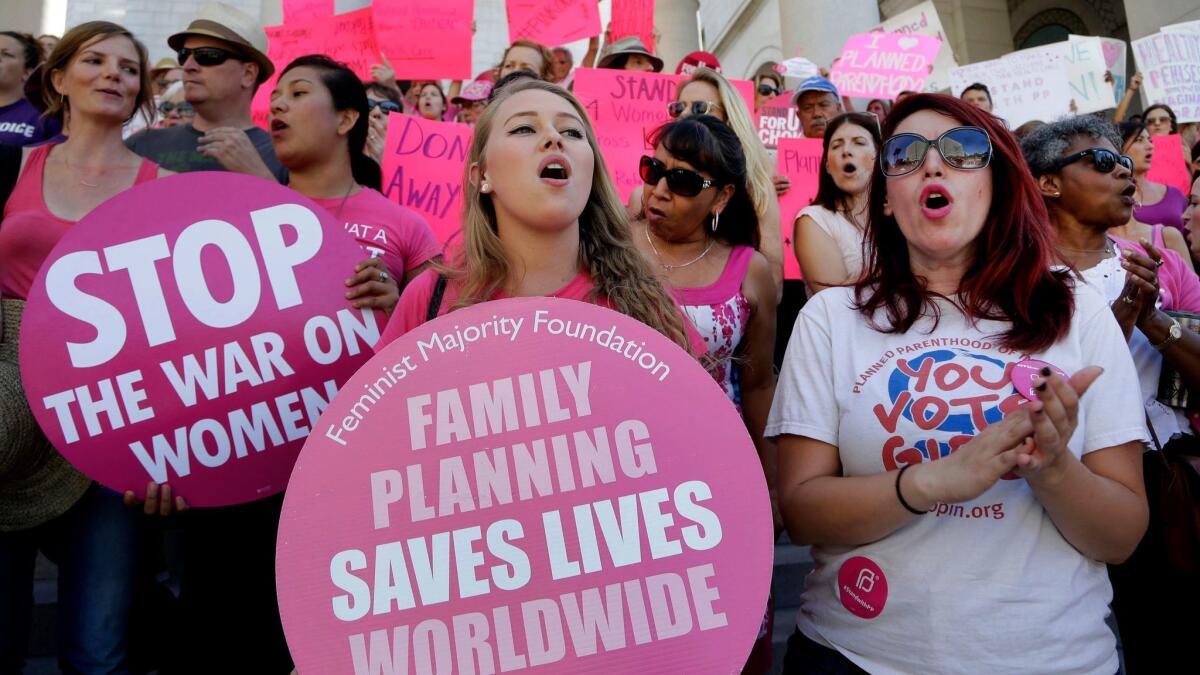Editorial: Defunding Planned Parenthood hurts the healthcare system

Way up high on the list of priorities of the newly empowered Republican-controlled Congress is the defunding of Planned Parenthood, the well-known and highly competent not-for-profit organization that provides a broad array of reproductive healthcare services to women throughout the country. Undermining or destroying Planned Parenthood has been a GOP obsession for years, but repeated efforts to cut the federal funding the organization receives have been unsuccessful. Last year, for instance, the House and Senate tried again to do so, but President Obama vetoed the bill. This year, however, Obama will no longer be there to do what needs to be done.
The first thing to understand is that this plan on the part of the Republicans has nothing to do with improving healthcare services. Members of Congress want to defund Planned Parenthood simply because it also provides abortions — which are anathema to many Republicans despite the fact that they are not only legal but are constitutionally protected, as has been affirmed by the Supreme Court in three different landmark decisions. The most recent of those decisions was handed down last summer.
Another thing to know is that it is already illegal under what is known as the Hyde amendment for federal dollars to be spent on abortions. So while it is true that part of Planned Parenthood’s mission is to provide abortions to women who want them, none of the money it receives from the U.S. government pays for that work.
[Defunding Planned Parenthood] serves the ideological beliefs of members of Congress, at the expense of working-class and poor women.
Finally, and most importantly, forbidding Planned Parenthood clinics to get Medicaid reimbursements for treating patients will cripple the delivery of reproductive healthcare services to millions of people, particularly women, most of them on Medicaid.
Planned Parenthood clinics around the country see about 2.5 million people annually. Many are lower-income, and the vast majority come not for abortions but for essential healthcare: breast examinations and cervical cancer screenings, testing and treatment for sexually transmitted diseases and infections, contraception and family planning, urinary tract infection treatments, and other primary care services. Planned Parenthood’s annual report for the year 2014 estimates that abortions represented only 3% of the care provided by the the organization.
In the state of California, alone, Planned Parenthood clinics get nearly 1.5-million patient visits each year. To help pay for those services, the organization in California received about $260 million in Medicaid reimbursements in the fiscal year ending in June 2016. Nationwide, the organization got about half a billion dollars in federal funding, the vast majority of that in Medicaid reimbursements in the year ending in June 2015.
Supporters of defunding insist that if Planned Parenthood goes away, other federally qualified community healthcare centers will simply pick up the slack. But health policy experts say that community clinics are already overburdened with patients and cannot, suddenly, expand to pick up the hundreds of thousands of people who would no longer be served at Planned Parenthood clinics.
Representatives of many of the community clinics agree with that assessment. “Eliminating Planned Parenthood from our state’s comprehensive network of care would put untenable stress on remaining providers,” wrote an official of the California Primary Care Assn., which represents California community clinics, in a letter to Sen. Barbara Boxer last year. “We do not have the capacity for such an increase in care.”
The Congressional Budget Office, in a report written last year, estimated that 390,000 people served by Planned Parenthood would lose access to care in the first year after defunding (although many of them would find it elsewhere in later years). The office also predicted that costs for Medicaid beneficiaries previously served by Planned Parenthood would rise if they did not receive contraception to avoid pregnancies and, as a result, gave birth.
In its zeal to punish Planned Parenthood for engaging in a perfectly legal activity, anti-abortion members of Congress would take away the Medicaid reimbursements that Planned Parenthood receives for providing essential healthcare services to hundreds of thousands of patients, even though those services are unrelated to abortion.
This defunding measure is petty and punitive. It doesn’t improve the healthcare system, but makes it worse. It won’t save money. It serves the ideological beliefs of members of Congress, but at the expense of working-class and poor women seeking basic healthcare services.
Congress should stop grandstanding on the issue of Planned Parenthood and get to work solving the real problems of real people in this country.
Follow the Opinion section on Twitter @latimesopinion or Facebook
More to Read
A cure for the common opinion
Get thought-provoking perspectives with our weekly newsletter.
You may occasionally receive promotional content from the Los Angeles Times.










